Summer Reading
Have some free time this summer? Here are some light summer reading suggestions. Most of these books aren’t available at Widener Law Library but you should be able to find them at your local public library or bookstore.
 Jeremy Blachman. Anonymous Lawyer.
Jeremy Blachman. Anonymous Lawyer.
Publishers Weekly review: Blachman’s side-achingly funny debut, derived from his popular blog of the title, is written in the candid, sanctimonious voice of Anonymous Lawyer, an ill-humored, ill-tempered hiring partner at a prestigious New York firm. Anonymous Lawyer is an 18-year man whose compulsion to blog is almost as strong as his desire for the firm’s chairmanship. When he’s not facing off with his nemesis, The Jerk, in the race for the chair, he takes solace in degrading his summer interns and hapless associates for his quickly developing cult of readers (who e-mail with guesses at his identity).
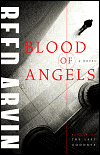 Reed Arvin. Blood of Angels.
Reed Arvin. Blood of Angels.
Publishers Weekly review: Thomas Dennehy, assistant DA of Davidson County, Tenn., is about to become famous. Unless he can figure a way out of it, he’ll be certified as the first lawyer in the country to have sent the wrong man to the death chamber. As if that isn’t enough, he must also prosecute a charismatic member of the local Sudanese community, Moses Bol, accused of killing a prostitute, in a trial that threatens to engulf Nashville in a full-scale race riot. Dennehy is tough, in court and out, and has plenty of interesting personal problems-primarily an ex-wife for whom he has conflicting feelings and an 11-year-old daughter he adores. He’s a highly sympathetic figure, as are Arvin’s other characters-except the bad guy who’s harboring a deadly grudge and a diabolical plan that confounds both Dennehy and the police. While trying to sort through his problems, Dennehy falls for an unlikely lady, Fiona Towns, a local minister and Moses Bol’s alibi. Perhaps this material isn’t quite as original as Arvin’s debut, The Last Goodbye, but the author is among the top handful of legal thriller writers working today, and this is another winner that thriller, mystery and general fiction readers alike will relish.
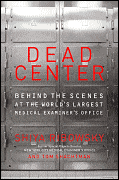 Shiya Ribowsky and Tom Shachtman. Dead Center: Behind the Scenes at the World’s Largest Medical Examiner’s Office. RA1025.R53 A3 2006
Shiya Ribowsky and Tom Shachtman. Dead Center: Behind the Scenes at the World’s Largest Medical Examiner’s Office. RA1025.R53 A3 2006
Review: Dead Center is an intimate and moving account of life in the ME’s office and how a nice Jewish boy wound up in a place many think of as ghoulish. The book opens on the morning of Sept. 11, 2001, but it is about more than that fateful day. It explains how deaths are really investigated in New York City, rather than the somewhat-glorified pictures of homicide investigations often painted by crime shows and movies.
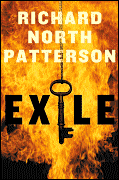 Richard North Patterson. Exile.
Richard North Patterson. Exile.
Library Journal review: Patterson (Conviction) pens a big legal thriller that is light on suspense but compelling nonetheless. David Wolfe, a successful Jewish lawyer with political ambitions, had a clandestine affair with Arab activist Hana Arif while in law school, but Hana left him to enter an arranged marriage. Thirteen years later, Hana is vacationing in San Francisco with her family when the visiting Israeli prime minister is assassinated by a suicide bomber, which brings a new level of terrorism to the United States. Hana stands accused as the mastermind of the murder and asks David to represent her, dramatically disrupting both their lives. While David isn’t entirely sure he believes his former lover is innocent, he finds many inconsistencies in the evidence against her. When it begins to appear that Hana is being framed, he goes to Israel in search of the truth. The stories of the Israelis and Arabs with whom David meets are unforgettable, but the central plot line and main characters are a bit thin. Still, Patterson delves evenhandedly into both sides of the Arab-Israeli conflict, making this a fascinating and timely read.
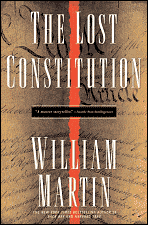 William Martin. The Lost Constitution
William Martin. The Lost Constitution
Publishers Weekly review: A rare, annotated draft of the U.S. Constitution is at the heart of Martin’s entertaining third novel to feature antiquarian book dealer Peter Fallon. As in Harvard Yard (2003), Martin tells two stories. The first chronicles the loss and recovery of the document at the time of the constitutional convention, where young Will Pike attends Massachusetts delegate Rufus King, and its passing through generations of the Pike family to the present. The second traces Fallon’s search against deadly competition to find the draft. Throughout, Martin makes clear that people have always tried to use the Constitution for their own purposes, including right-wing Christian fanatics, survivalist gun nuts, liberal gun-banners and greedy entrepreneurs now seeking the lost draft. The Pike family motto: “In America, we get up in the morning, we go to work, and we solve our problems” serves as a unifying theme, and Martin also makes clear that the Constitutionódrafts and allówas intended as a unifying agent. This is a good mystery, a better examination of constitutional issues and a superb paean to New England, its people, natural beauty and resources.
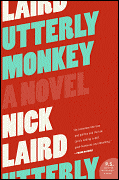 Nick Laird. Utterly Monkey
Nick Laird. Utterly Monkey
Publishers Weekly review: Lairdópoet, former lawyer and husband of Zadie Smithódebuts, lad-lit style, with this sometimes entertaining story of childhood friends whose paths diverged radically and then reconverged. Danny Williams is a well-paid (if deeply unenthusiastic) lawyer at a prestigious London firm; Geordie Wilson, his boyhood chum from Northern Ireland, is “officially an unemployed labourer” who’s just showed up on Danny’s doorstep desperate for a place to stay. Geordie’s in trouble with the Ulster Unionists back home, primarily because he has a sack full of their cash; Danny’s been told he needs to go back to Northern Ireland to deal with a corporate takeover. Geordie joins forces with Danny, more out of idle curiosity than a sense of urgency (though the Unionists are planning something nasty). Laird’s writing is clear and amusing, and both his protagonists are likable. But their aimlessness impedes the building of any narrative momentum, and the book’s climactic scene is as rushed as it is contrived. The novel is well intentioned, clever and occasionally quirkyóbut the whole feels like less than the sum of its parts.
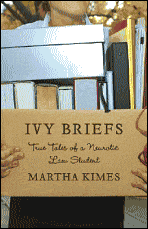 Martha Kimes. Ivy Briefs: A privileged and Confidential Law School Story.
Martha Kimes. Ivy Briefs: A privileged and Confidential Law School Story.
Publishers Weekly review: First time author Kimes is entertaining and funny in recounting her
three years at one of the country’s premier law schools. A smart young
woman with a good, but not always engaged, sense of perspective, Kimes
jumps from the University of Wisconsin to Columbia Law School on the
wings of a spectacular showing on the LSATs. Once there, she faces the
predictable sadistic professor, hypercompetitive fellow students and,
of course, rampant elitism. Kimes is happy to treat with an equal
measure of humor the highly stylized courting dance between summer law
clerks and mega law firms, as well as the foreboding horrors of the bar
exam. Though some stories seem hyperbolic and re-created conversations
can be suspiciously pat, Kimes captures with accuracy the gestalt of
the law school experience. Kimes did get a job at what she calls
“Lavish Law Firm.” But she eventually left to join the Make-a-Wish
Foundation, which may be her final comment on the world of big-time
law. The self-deprecating wit, catty observations and healthy sense of
the absurd with which Kimes describes her approach-avoidance reactions
to the world of law school raise the book above the ordinary.
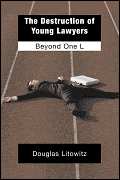 Douglas Litowitz. The Destruction of Young Lawyers: Beyond One L. KF298 .L58 2006
Douglas Litowitz. The Destruction of Young Lawyers: Beyond One L. KF298 .L58 2006
Amazon review: Doug Litowitz’s book on young lawyers is a must read for lawyers, law professors, law students, and potential law students. Although Litowitz occasionally overstates a point–for example, I disagree that all, or most, law professors were unsuccessful lawyers and that all, or most, law professors employ the Socratic method to demoralize students–authors are permitted poetic license if the general message they are trying to convey is important and true. Litowitz’s message is both of these things: the systems through which we train and employ young lawyers is broken and needs to be fixed. Litowitz’s book is also extremely well-written, and holds the reader’s attention from start to finish. I recommend it unreservedly and I commend Litowitz for his brave and profound book.